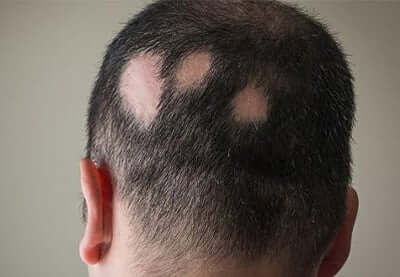Alopecia Areata: Causes, Symptoms, and Treatment


Hair loss directly impacts the quality of a person’s life. Many reasons can cause it. To understand the most suitable solution for hair loss, it is important to understand the reason for hair loss. This entire text is dedicated to Alopecia Areata, an autoimmune disease where your immune system starts attacking your hair follicles and causes hair loss.
What is Alopecia Areata?
Alopecia Areata or spot baldness is a hair loss condition where the hair of the person falls out in small patches. ‘Alopecia’ stands for baldness, and ‘Areata’ stands for patchy hair loss. It is an auto-immune disorder in which the white blood cells of the immune system attack the hair follicles of the person and prevent hair growth. The person’s immune system mistakenly assumes that tissues of that specific part of the body are diseased, and those tissues try to defend themselves to grow hair back normally.
Most people who are suffering from alopecia areata notice falling hair in small and round patches. The size of the patches can vary from 1/8 inches to 4 inches in diameter. This hair loss occurs mainly on the scalp or in the eyebrows but can also affect other body parts. In uncommon cases, hair loss can be noticed on the entire scalp or whole body.
In some cases, it is caused when both parents of the person contribute several specific genes that may cause hair loss. It can affect people of any age group, but it commonly appears during early adulthood. Both men and women can be affected by this disease.
Alopecia Areata occurs over weeks, and hairs usually grow after months, but they might fall out again if the proper alopecia areata treatment is not done promptly. It is not painful or disabling, but it can change a person’s appearance and affect self-esteem. Therefore, it is essential to identify the early signs of alopecia areata and contact the doctor to get the best alopecia areata medical treatment.
What are the early signs of this hair loss problem?
The most common sign of Alopecia areata is hair loss. Additionally, the most commonly noticed symptoms are:
- Bald patches on the scalp or other parts of the body, including eyebrows, eyelashes, arms, legs, underarms, chest, and back,
- Enlarging of bald patches,
- Losing a lot of hair over a short period, and
- Redness and brittleness in fingernails and toenails.
The skin of the bald patches caused due to this hair loss is smooth and has no rashes or redness. However, people may feel tingling, itchiness, or burning sensations on the skin before hair fall.
Alopecia areata can spread on the edges of the hair and can make edges thinner at the roots. When the roots become narrower, the hair falls out. As long as the hair looks more delicate and is easy to pull out, this hair loss disease is active. If you notice any early signs of this hair loss problem, search for alopecia areata doctors near me and contact them as soon as possible.
Who will suffer from this hair loss problem?
Alopecia areata can happen to anyone, but adolescents and young adults are more prone to it. It could be more progressive and extensive when hair loss is seen in children younger than ten years of age.
Alopecia areata is significantly seen in men because they might also have a family history of hair loss. They might notice hair loss in the facial area, scalp, chest, or back. Compared with male-pattern baldness, this disease shows gradual thinning of hair and patchiness. Therefore, there is a requirement for alopecia areata treatment for men whenever they notice such symptoms.
Alopecia areata is also typical in women. Their hair loss can be noticed on the scalp, eyebrows, and lashes. It is different from female-pattern hair loss and is associated with thinning of hair in the small area. The appropriate alopecia areata treatment for a female is required to solve this problem.
Additionally, if your close family member suffers from alopecia areata, they are a higher chance of suffering. It has been scientifically proven that several genes are linked to this disease, reflecting those genetics plays a significant role. And most genes that are related to alopecia areata also play an essential role in the functioning of immune systems. People with auto-immune conditions like thyroid, vitiligo, or psoriasis have more chances to suffer from alopecia areata. Therefore, if someone suffers from this type of hair loss, the doctor will suggest keeping the immune system more robust.
What are the treatments available at DHI Clinics?
The most common alopecia areata hair loss treatment is Steroids. For the alopecia areata to be a successful treatment, the doctor will either inject or topically offer the steroids to the affected areas. Another alopecia areata hair regrowth treatment is Immunotherapy, where the doctor will work on strengthening the immune system.
The best dermatologist for alopecia areata at DHI clinics will diagnose alopecia areata by closely examining the scalp. Then, depending on the area of this hair loss, the disease’s extent, and the patient’s age, the best alopecia areata treatment is selected. Also, the diagnosis will be accompanied by thoroughly reviewing the medical history.
The most common alopecia areata hair loss treatment is Immunotherapy, where the doctor will work on strengthening the immune system.
The Alopecia areata treatment for women will be the same as for men. However, the medicine may vary depending on the impacted area. The DHI doctor will gently pull out a couple of hair follicles and examine them under the microscope. To understand whether the person has other autoimmune diseases or not, they might also perform a blood test. Depending on the report, the best possible treatment for alopecia is suggested.
Alopecia areata symptoms and treatment are very distinctive, which helps DHI doctors to quickly perform the diagnosis and suggest the best alopecia areata permanent treatment. So, if you see early symptoms of alopecia areata, contact DHI Clinics.
Why is the DHI Clinic the best to resolve this hair loss problem?
DHI Clinic operates to offer the best, latest, and most effective solutions for hair loss. As one of India’s best hair transplant centers, we diagnose the impacted area while maintaining transparency with the candidate and suggest the best hair loss treatment for them.
DHI Clinic has a team of the finest doctors for alopecia areata who can offer the best possible alopecia areata beard treatment, alopecia areata eyebrows treatment, alopecia areata face treatment, alopecia areata scalp treatment, and other treatments depending on the area to be treated. We also offer the alopecia areata hair transplant if the hair loss is permanent. The treatment depends on the hair loss condition to deliver 100% natural results.
Consult the DHI’s best doctor to treat alopecia areata. Book a hair loss consultation now!
